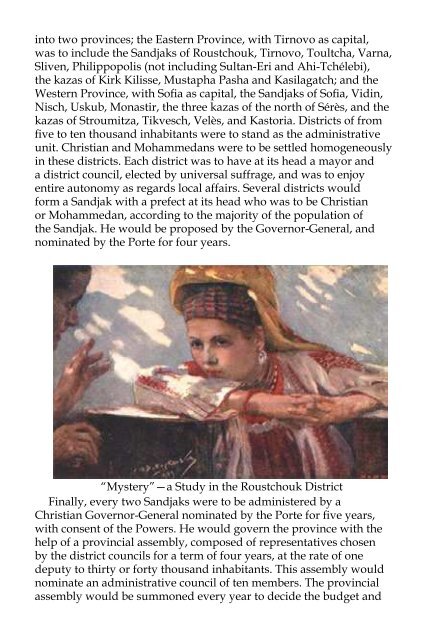Bulgaria e-book - iMedia
Bulgaria e-book - iMedia
Bulgaria e-book - iMedia
You also want an ePaper? Increase the reach of your titles
YUMPU automatically turns print PDFs into web optimized ePapers that Google loves.
into two provinces; the Eastern Province, with Tirnovo as capital,<br />
was to include the Sandjaks of Roustchouk, Tirnovo, Toultcha, Varna,<br />
Sliven, Philippopolis (not including Sultan-Eri and Ahi-Tchélebi),<br />
the kazas of Kirk Kilisse, Mustapha Pasha and Kasilagatch; and the<br />
Western Province, with Sofia as capital, the Sandjaks of Sofia, Vidin,<br />
Nisch, Uskub, Monastir, the three kazas of the north of Sérès, and the<br />
kazas of Stroumitza, Tikvesch, Velès, and Kastoria. Districts of from<br />
five to ten thousand inhabitants were to stand as the administrative<br />
unit. Christian and Mohammedans were to be settled homogeneously<br />
in these districts. Each district was to have at its head a mayor and<br />
a district council, elected by universal suffrage, and was to enjoy<br />
entire autonomy as regards local affairs. Several districts would<br />
form a Sandjak with a prefect at its head who was to be Christian<br />
or Mohammedan, according to the majority of the population of<br />
the Sandjak. He would be proposed by the Governor-General, and<br />
nominated by the Porte for four years.<br />
“Mystery”—a Study in the Roustchouk District<br />
Finally, every two Sandjaks were to be administered by a<br />
Christian Governor-General nominated by the Porte for five years,<br />
with consent of the Powers. He would govern the province with the<br />
help of a provincial assembly, composed of representatives chosen<br />
by the district councils for a term of four years, at the rate of one<br />
deputy to thirty or forty thousand inhabitants. This assembly would<br />
nominate an administrative council of ten members. The provincial<br />
assembly would be summoned every year to decide the budget and<br />
the taxes. The armed force was to be concentrated in the towns and<br />
there would be local militia beside. The language of the predominant<br />
nationality was to be employed, as well as Turkish. Finally, a<br />
Commission of International Control was to supervise the working of<br />
these proposals.<br />
The Porte promised reforms on these lines, but did not go beyond<br />
promising. The task of forcing her to end a cruel tyranny was one for<br />
the battlefield.<br />
The Russo-Turkish War broke out on April 12, 1877, and what<br />
Turkey had refused to yield of her own accord was wrested from<br />
her by force of arms, in the preliminary treaty of San Stefano. By<br />
this treaty, <strong>Bulgaria</strong> was made an autonomous principality subject<br />
to Turkey, with a Christian government and national militia. The<br />
Prince of <strong>Bulgaria</strong> was to be freely chosen by the <strong>Bulgaria</strong>n people<br />
and accepted by the Sublime Porte, with the consent of the Powers.<br />
It was agreed that an assembly of notables, presided over by a<br />
Russian Commissioner and attended by a Turkish Commissioner,<br />
should meet at Philippopolis or Tirnovo before the election of the<br />
Prince to draw up a constitutional statute similar to those of the other<br />
Danubian principalities agreed to after the Treaty of Adrianople in<br />
1830.<br />
The Treaty of San Stefano brought into being on paper a <strong>Bulgaria</strong><br />
greater in area than the <strong>Bulgaria</strong> of 1912, and greater even than the<br />
<strong>Bulgaria</strong> of 1914. But the Treaty was not ratified. Other European<br />
Powers, alarmed at the prospect of Russia becoming supreme in the<br />
Balkans through the aid of a <strong>Bulgaria</strong>n vassal state, interfered, and<br />
the Congress of Berlin substituted for the Treaty of San Stefano the<br />
Treaty of Berlin.<br />
The Treaty of Berlin provided:<br />
<strong>Bulgaria</strong> is to be an independent Principality, subject to the Sultan,<br />
with a Christian government and a national militia; the Prince of<br />
<strong>Bulgaria</strong> will be freely chosen by the <strong>Bulgaria</strong>n nation and accepted by<br />
the Sublime Porte, with the approval of the Great Powers; no member<br />
of a reigning European family can be elected Prince of <strong>Bulgaria</strong>; in case<br />
of a vacancy of the throne the election will be repeated under the same<br />
conditions and with the same forms; before the election of the Prince,<br />
an assembly of notables will decide on the constitutional statute of the<br />
Principality at Tirnovo. The laws will be based on principles of civil and<br />
religious liberty.<br />
By the Treaty of Berlin the boundaries of <strong>Bulgaria</strong> were very





